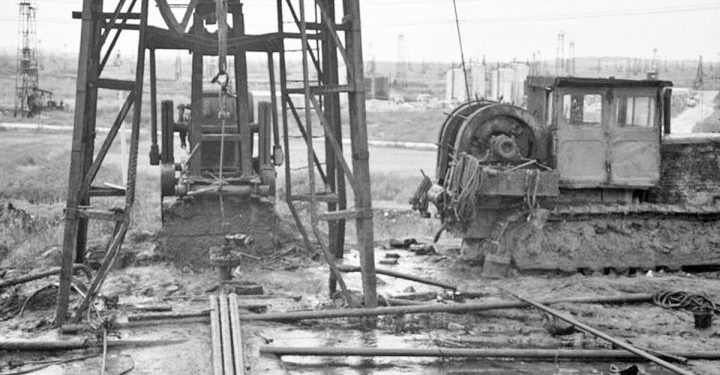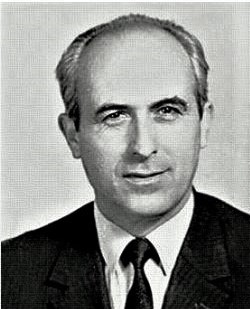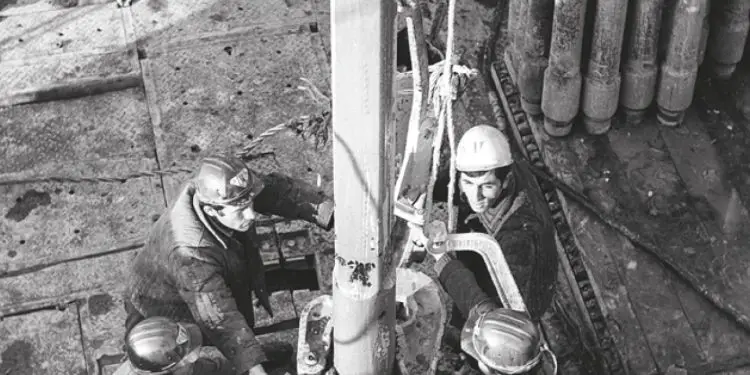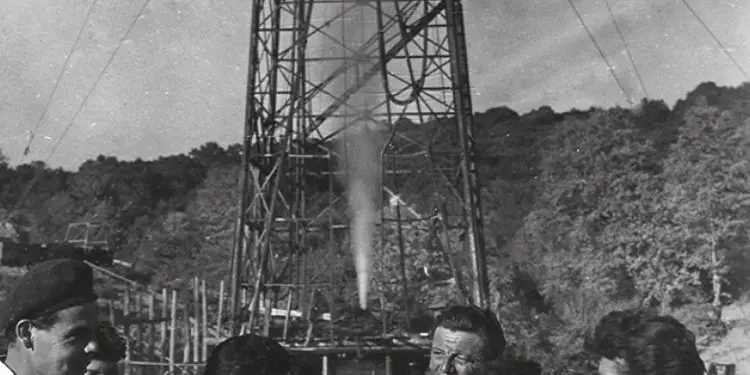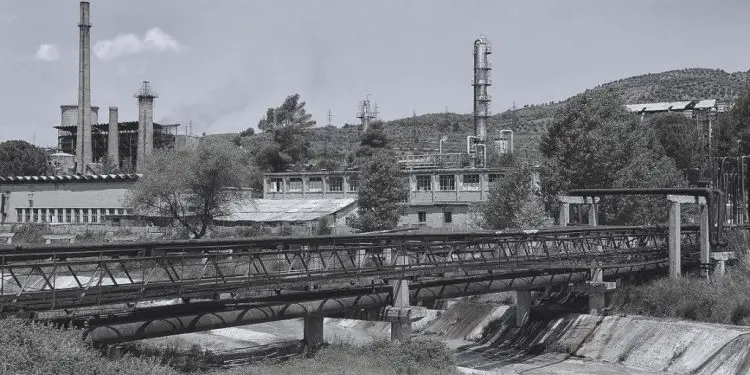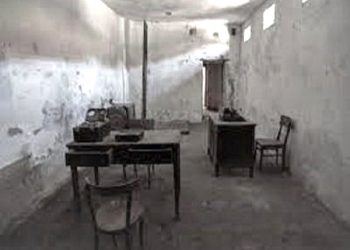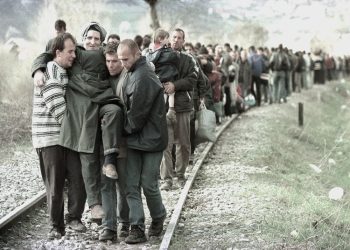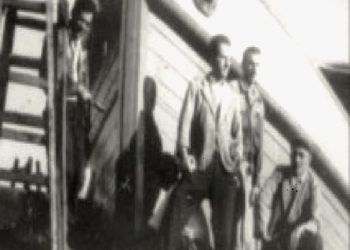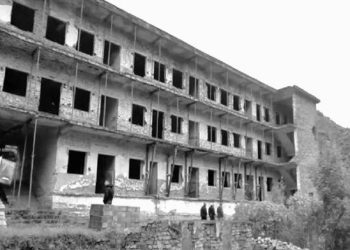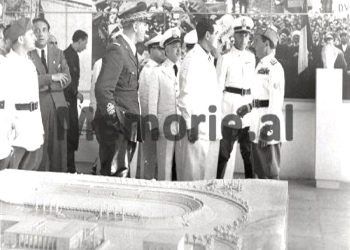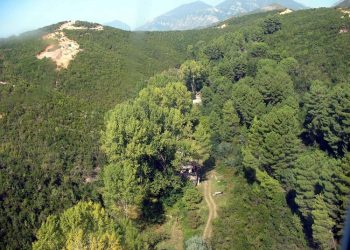By Petraq Xhaçka
The seventh part
Memorie.al / The purpose of this book are to join the efforts made to present the truths and horrors of the communist dictatorship in Albania. The main purpose of the book is not to show our people or anyone else that we oilmen have been innocent, because this has become known from publications in our press, from foreign televisions, as well as from direct meetings with the International Forum and the Albanian Human Rights. The author’s desire, is that through this story, along with other stories, fight any manifestation in any form, even moderate, that he may have to create a communist society. I think that even through this bitter personal history, the cruel, treacherous and overbearing face of Enverism will appear, that for half a century, held the knife with the tip in the chest of the Albanian people, with a pine eye, intercepting the movements for salvation from the outside, or rebellion of the people themselves, ready to push the knife to the heart, at the first movement. The events are set in the economic fields where it has appeared most strongly, such as the oil and gas industry, where I was fortunate to pour my energies, for a lifetime, and become a participant and witness in those events. All the events that are written in this memoir are true, not only without any exaggeration or embellishment of them, but perhaps, I don’t know how much I have been able to present the terrifying force of the events that took place in that decadent system of socialism, where there was no human feeling.
Continues from last issue
Russian specialists in our oil fields
The arrival of young senior Albanian specialists from foreign schools and our group of technicians coincided with the period when the so-called hostile group, among whom Prof. Stanislav Zuber, and others. The precious studies of these eminent specialists were blocked. Now after 1948, in the Oil Plant based in Kuçovo, the technical management and organizational supervision were taken over by Soviet specialists.
When we started work as young technicians, we saw that from the top of the state pyramid, this cooperation and this help was evaluated as excellent. The opinions of those few Albanian engineers were not valued enough, although they were often right. So there was a fessification of the opinion of the specialist, or the Soviet leaders. This was not fair at all. They had in their hands the direction of all the main areas of the economy and political and military life. We felt these during our daily work in the oil industry. No one could go against the word of the Russians, if they didn’t have to enter the mold of “anti-Soviet activity”, which was punishable by imprisonment or something more.
For the sake of truth, it must be said that among the Soviets sent to us, there were capable specialists, good leaders, honest and dedicated workers. But there were also those with little experience, and often unskilled.
So when we went to Kuçovo, after finishing the technical school, at the Oil Plant we found one of them, the chief geologist Burxhanadze. He not only taught and guided us young geological technicians, but also protected us from the harsh and inappropriate criticisms made by some workers or specialists, towards our necessary actions for geological problems in the wells. This came to them mainly from ignorance, but the desire to ignite their own vigilance, so encouraged by the party organizations, was also not small.
Their lack of knowledge of the duties and competencies of this science was like doing ask! The objective impossibility to accurately determine some things, especially in the new areas of research wells, existed then, and still exists now. In our country, this service was completely new, with no experience. The technical and technological level of equipment at that time was quite backward. Burjanadze, had the patience and understanding to work with those devices and with those people around him. But of course, not everyone could be like Mr. Burjanadze.
When I had returned from my studies in Moscow, after almost a year of working in the extraction company, evaluating my work very well, I was appointed Chief Geologist of the Oil Plant in Kuçovo. A Soviet engineer also worked there. He was the advisor to the general director. Even though I was young, I began to disagree with many of the problems and decisions he made. At the directorate meeting, I expressed my objections, an attitude that the guest did not like at all.
Apparently, the Soviet adviser had complained to the Party Committee of the oil industry in Kuçovo. Maybe someone else had reported there. Thus, one autumn day in 1960, I was called to the office of the First Secretary, Haki Toska. Haki Toska pointed out to me, carefully lined up, some of the instances of my clashes with the Soviet adviser. He reprimanded me for these kinds of attitudes and advised me to be careful and not to oppose my specialist friend.
-Such actions are punishable, – said the Secretary gently, but very firmly. In my reply, I admitted that I should have been more careful, even though it was not good at all, for me to agree with opinions or decisions that are technically wrong, either by him or by any of our specialists.
– Thank you, friend Haki, – I said at the end. – I will take into account your precious remarks and advice, so that I can be more careful with him or other Soviet specialists. I will find ways to show and defend my thoughts to the end, but I assure you that I will do this very carefully. When I got out, I realized that even by defending the right, I could get myself into a lot of trouble.
On the eve of the New Year, a delegation of Soviet specialists, among the best for the various sectors of this industry, came to the oil industry. In the close meeting we had with the head of the delegation, member of the Academy of Sciences of the Soviet Union, Academician Mirçink, in the presence of the Soviet adviser, I presented the technical divergences that I had with him. After listening to both of us, he completely gave me the right, addressing him with this expression: “Petraqi knows things better and more correctly than you, my son.”
From the beginning of 1961, the Soviet-Albanian relations immediately took a big turn, until their complete breakdown, due to the disagreement of the leaderships of the two parties. As much as to put my mouth on the gas, but it came to pass that with the breakdown of these relations, to the point of enmity, those clashes of mine with the Russian adviser, received a lot of appreciation from the leading structures of our state.
My quarrel with the engineer who came from the Soviet Union was considered a principled, courageous and even patriotic stance in defense of the interests of my country, which I didn’t even think about! This evaluation, although inflated by opportunism, turned into some encouragement for my work, which now, after the departure of the foreign specialists, became more responsible. The petroleum geological service had an important role in the field of discovery of new oil and gas settlements, in the extraction of oil, which ultimately involved huge expenses. Narta was the most profitable industry.
It provided the largest currency in dollars, supported more than any other production the country, in its policy of isolation and closing the borders. We geologists put ourselves to persistent work, wanting to fill the gaps of little experience with dedication and sweat.
Many people had hoped that after the break with Moscow, the party and state leadership of Albania would review its mistakes and finally open up to the West. Unfortunately, it closed the “post-block” even more, trying to get over the founders of Marxism-Leninism themselves, with “even more revolutionary” practices, but which in fact brought it closer and faster country, towards the slope. The dictatorship became more brutal, the economic backwardness became greater and human rights were lost altogether.
In this very delicate situation, the government’s demands to discover new resources became even greater. In the name of this need, at the General Directorate of Oil, in Kuçovo, a small group of general geological studies was established and named “Geological Bureau”. We all devoted ourselves to the work with selflessness, to re-examine all the geological material collected in our country earlier, by foreign geologists and the few Albanians.
We judged that our contribution was for the benefit of our suffering people, of a country that until those years had never seen the light, but only hostilities, wars against the invaders and now, it was facing a complete isolation, which brought difficulties even for bread, and not for more.
The dictatorship did not allow anyone to raise a finger against its policies. The only patriotic duty for myself and my fellow geologists, in that dire situation, I considered strengthening the oil industry. And life later showed that we worked well and rightly. We worked to serve our people as intellectuals as possible, to increase their well-being. Politics was not in our hands. We couldn’t change that.
Against the Soviet specialists, against the help of the Soviet state, the Albanian leadership began to throw mud, cursing and accusing them of everything. It went crazy to the other extreme, where no one could even say a good word about the work they had done. Without fail, he was put in prison as a pro-Soviet.
Those oilmen, who had married Soviet women, once among the most respected people, now, with the breakdown of relations, almost all ended up in prisons, as “foreign agents”, or under the accusation of having done agitation and propaganda. Precisely, as always, their families were brutally mistreated: they were expelled, exiled, singled out for everything.
Old songs, with new words
The events that took place in Albanian politics were strongly reflected in the oil industry, as the most important sector of the economy. For this reason, it is worth briefly presenting some of these moments. In oil, the influence of the working methods of the countries with which the Albanian policy was changed was felt, because specialists from these countries came to work there and their word was decisive. When political relations changed, everything changed, including the assessment of their help.
This two-facedness of the Albanian communist leaders had appeared equally in the history of relations with other countries. In the same way the boundless love was shown, in the same way the sides of the mountains were decorated, with giant rock inscriptions, on the immortality of this friendship, the same submission was revealed, the same blindness, the same punishment for those who were suspected of having an aunt in their eyes, the friendships of Enver Hoxha and the Slavs of all kinds, the same hatred came after the destruction.
With the breakdown of relations between the Albanian Labor Party and Tito’s Yugoslav Communist Party in 1948, any assessment of previous cooperation was clouded. What was said was forgotten. Everything was darkened and it was like a box of evaluation, that whoever cursed the most, he was the best and he was trusted the most. Tito’s policy was called revisionist and he, until then called a great communist and internationalist, was re-designated; accomplice of American imperialism!
Now it was the turn of hostilities with the Russians, as ten fifteen years later would come hostilities with the Chinese. But all this left a heavy toll. Imagining that the Chinese lifestyle was grafted into the Albanian culture of life, even though it was communist, gives you chills. The arrogance of the Albanian leadership reached the point where the party secretaries began to cover their heads with Chinese caps, wear closed military jackets, with Mao Zedong badges on their chests, and pens in their outer pockets.
This is how the disdain for the women’s toilet, the overwork of intellectuals in working in the fields of cooperatives, putting the village above the city, and thousands of chinaware, that today you feel dirty to remember, and you throw them on paper, were adopted.
Such was the blow on the army, where according to the Chinese experience; orders were given to remove the ranks of officers. Such were the lightning-bolts, which turned out to be nothing more than a complete imitation of the Chinese “Tan Xi Baove” sold as means of proletarian democracy. The ugly paper-lightning, violently entered the orbits of the private lives of people, friends, neighbors and anyone who did not enjoy inviolable authority, becoming forms of inciting hostilities, in the oppressed layers of society.
In Berat, a 40-year-old doctor fell in love with a 20-year-old girl. They decided to get married. Sheets of lightning were drawn up condemning this action of the doctor, ages were calculated and the opinion, mixed with his Chineseness, condemned this marriage, which really did not end.
An engineer from the Oil Institute, who had just finished her studies in Romania, became the target of lightning because her coat was shorter than the norm allowed by the opinion of the proletarians. She cried for a long time, for this interference in her tastes. Can anyone imagine today that the lightning sheets were drawn up inside an institution of high and medium specialists, for academic work?!
And our family tried the effect of Chinese leaf lightning. One such person climbed the walls of Kuçova, a citizen there, proletarianly concerned, why we didn’t take our son to daycare, like everyone else, but when my wife was at work, we let him be kept by a family.
The poor hygiene conditions in the nursery, the serious illness of the two-year-old boy, as well as the danger to his life, were insignificant before the Chinese uniformity of sending the little ones to the designated centers.
We did not respect the proletarian message posted on the wall: the dear family of Kiu Bush, continued to hold our son, with the same care as they hold their own children, our son recovered and we are grateful for life, the Bushi family.
I cannot blame a simple citizen from Kuçova, when the party leaders themselves entered without invitation and even zealously into the private lives of specialists and managers of their enterprises, speaking strongly the party word, even in the elections of the companion of life, in the engagements and marriages of their subordinates.
So a few years before the incident on the nursery of Genci, in the summer of 1961, I decided to connect my life with Zhaneta Pluska from Tirana. A few months before the wedding, I was asked to appear at the lower buildings of the Guest House in Kuçovo, where high state figures were housed. The member of the Party’s Central Committee, Peti Shamblli, was waiting for me. He didn’t hesitate to get straight to the point.
– You, friend Xhaçka, should break the engagement you have made, – he told me without many indirect words. – You should break up with Zhaneta Pluska, because she comes from a family of bourgeois origin. Her father completed his higher studies in a capitalist country, at the University of Oxford in England.
I began to find a way to contradict him and explain my disobedience. – First of all, friend Peti, I have already given my word. Secondly, my fiancee’s father, engineer Sotir Plluska, was a very honest intellectual who contributed a lot to the construction of roads in our country. It is not involved in politics at all.
He remained dissatisfied with my attitude, and perhaps for this reason, after a while, he called me a person even more important than Shambli: exactly the Chief of Staff of the Army, Petrit Dumja himself! I neither knew him personally nor had I ever met Petrit Duma before! He told me the same things about the importance of the class struggle, but on the other hand, I also held fast to the objection I had made earlier.
I was able to withstand the pressures that important party cadres put on me. I married Janet, I enjoyed her boundless love, I tried to give her my love quadrupled but, unwillingly, I gave her a bitter “big spoon” of my fate, which I did not, but especially this beloved being, he did not deserve it at all. Memorie.al
The next issue follows




